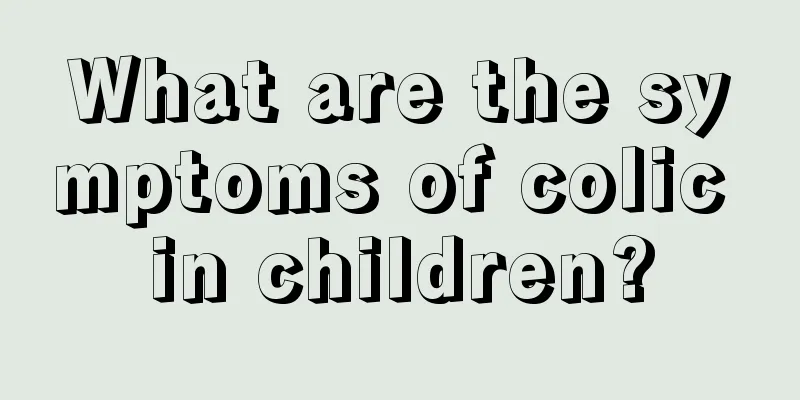What are the symptoms of colic in children?

|
Colic in children is actually a normal physiological symptom. Generally, colic lasts for a relatively short time and will disappear as the child grows older. The most obvious symptom of colic in children is abdominal pain, and some children will be distressed by the pain, so parents should learn more about the reasons for their children's distress and find ways to relieve it. Infant colic refers to the sudden loud crying of some infants, which can last for several hours or occur in paroxysmal attacks. When the baby cries, the face gradually turns red, the area around the mouth turns pale, the abdomen becomes swollen and tense, the legs curl up, the feet become cold, and the hands are clenched. Holding, coaxing, or feeding cannot relieve the crying. The baby will eventually stop when he or she is exhausted, passes gas, or has a bowel movement. This phenomenon is usually called infant colic. This is pain caused by strong contractions of the smooth muscles of the infant's intestinal wall or intestinal flatulence. It is the most common type of acute abdominal pain in children. It often occurs at night, mostly in infants under 3 months old, and is more common in infants who are easily excited, excited and irritable. What are the symptoms of neonatal colic? 1) A common symptom of colic is sudden screaming, sometimes followed by crying so hard that the face and neck become red and thick. 2) Some newborns may have shaking heads, arched bodies, and slightly rapid breathing; at the same time, their abdomens may be swollen, their hands may be clenched into fists, their feet may be stretched or bent, and the extremities may often be cold. 3) The above-mentioned behaviors can last from tens of minutes to several hours. No matter how you rock, hold or coax the child, it is often of little use until the child is exhausted. Sometimes there is a slight improvement after a bowel movement or a fart. This symptom can occur at any time, but it most often occurs in the evening or early evening, and almost at a fixed time every day. Causes of colic in babies Baby colic is one of the most difficult to explain phenomena in a baby's life. No one knows why some babies have more colic than others, but there are many theories about the cause. One reason may be that some babies have a more immature or sensitive digestive system. Newborns have very few digestive enzymes or juices in their digestive tracts, especially amylase, to break down food. Therefore, when the protein or sugar content in breast milk or formula is too high, the baby may suffer from abdominal bloating and pain (colic) due to insufficient digestive juices. In addition, babies swallow too much air when crying, which can also cause bloating. |
<<: What are the symptoms and treatments for children with intestinal spasms?
>>: What are the symptoms of kidney yin deficiency in children?
Recommend
Prevention of tonsil polyp inflammation in babies
If you do not pay attention to oral hygiene, you ...
What to do if a 6-year-old child has a hunchback
For children, health is everything. Only a health...
The child's chest pain will go away after a while.
The chest is where our heart is located. If pain ...
What are some weight loss exercises for kids?
Many children are obese, which makes their famili...
What should a 5-year-old child eat if he is constipated?
Speaking of constipation, many friends think that...
What is the disease on the baby's feet
Once some mothers find red spots on their baby’s ...
Where is the best place to treat ADHD in children?
Attention Deficit Hyperactivity Disorder (ADHD) i...
What to do if your child is lactose intolerant
I believe that many mothers do not know how to de...
How to deal with baby’s dandritis?
If your baby is constantly losing hair or dandruf...
How to use alcohol to cool a child's fever
Children's physical health is an issue that m...
Treatment of scleredema infantum
Every child is very important to the family, espe...
What's wrong with children's blood in urine?
The problem of hematuria not only occurs in adult...
Baby's nails are uneven
The baby's nails have a certain indicative si...
Causes and prevention of allergic rhinitis in children
Because of not paying attention to hygiene, not r...
How to prevent hiccups in newborns?
Generally speaking, since the digestive system of...









